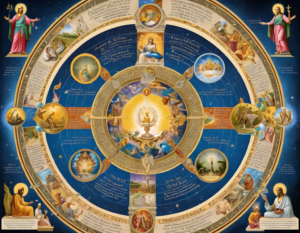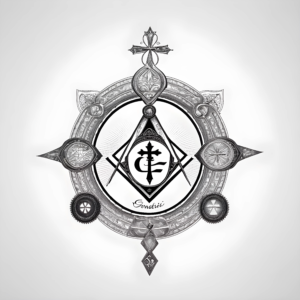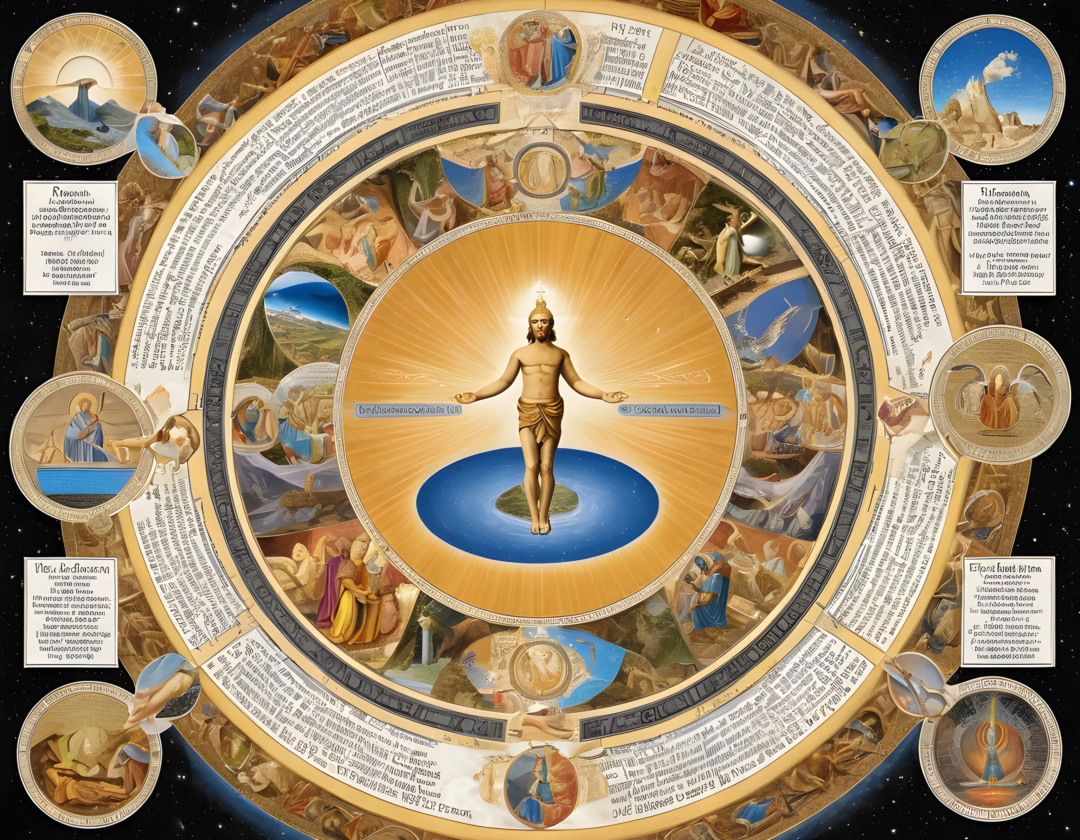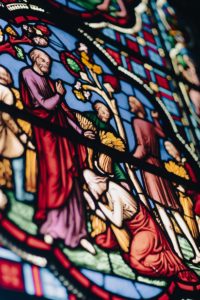# Introduction to Gnosticism: Exploring Ancient Wisdom
Gnosticism, a term derived from the Greek word ‘gnosis’ meaning ‘knowledge,’ refers to a collection of ancient religious ideas and systems which emerged in the first century AD. Unlike mainstream Christianity that emphasizes faith for salvation, Gnosticism prioritizes personal spiritual knowledge over the orthodox teachings and rituals. This knowledge is not of the intellectual kind but is an experiential revelation that comes from within, believed to connect the believer directly with the divine.
Gnosticism presents a distinctive approach to Christianity, emphasizing the idea that humans are divine souls trapped in the material world. This worldview was influenced by various philosophical and religious traditions, including Platonism, Judaism, and early Christian thought. The Gnostic belief system revolves around the concept of a supreme, unknowable God and a lesser, ignorant creator god, often identified with the God of the Old Testament.
# The Roots of Gnostic Thought: Historical Context and Key Influences
The roots of Gnostic thought can be traced back to the intellectual and cultural melting pot of Alexandria, Egypt, during the first few centuries CE. This was a time of great philosophical flourishing where ideas from the East and West intermingled. Influences from Platonic philosophy, which posited a distinction between the ideal and the material, were significant in shaping Gnostic thought. Additionally, the encounter with Eastern religions introduced notions of karma and reincarnation.
The Jewish tradition also significantly influenced Gnosticism, particularly through the interpretation of the Hebrew Scriptures in new and often controversial ways. The figure of Sophia, for example, originates from the wisdom literature of the Hebrew Bible but is transformed in Gnostic texts into a key figure in the divine realm whose story explains the creation of the material world.
# Core Beliefs of Gnosticism: Understanding the Divine Spark
Central to Gnostic belief is the concept of the ‘divine spark.’ According to Gnostic theology, each human contains a fragment of the divine essence, trapped within the physical body. This divine spark originated from the true God and is in exile in the material world, which is under the control of the Demiurge, an inferior god who created and governs the physical universe.
The goal of Gnostic practice is the awakening of this divine spark through the acquisition of gnosis, or secret knowledge. This knowledge is not merely intellectual but involves a transformative experience that leads to spiritual enlightenment and liberation from the material world. The path to this knowledge is often depicted as highly esoteric, accessible only to the initiated.
# Gnosticism vs. Mainstream Christianity: Key Theological Differences
The theological differences between Gnosticism and mainstream Christianity are profound and primarily revolve around their views of God, salvation, and the role of Jesus Christ. While orthodox Christianity emphasizes the incarnation of Christ and his atoning death and resurrection as the path to salvation, Gnosticism views Jesus more as a revealer of wisdom than a savior through death.
In Gnostic texts, Jesus often appears as a teacher who imparts knowledge to his disciples about the divine realm and their origin, rather than as a redeemer figure who dies for the sins of humanity. This knowledge, rather than faith or grace, is considered the key to salvation in Gnostic belief.

# The Role of Secret Knowledge in Gnostic Practices
The pursuit of gnosis is central to Gnostic practice and is often guarded as secret knowledge, revealed only to a select few. This esoteric knowledge typically encompasses insights into the divine nature of the soul, the origins of the universe, and the means by which the soul can return to the divine realm. The secretive nature of this knowledge often led to accusations of elitism and heresy from mainstream Christian authorities.
Gnostic practices may include mystical experiences, meditations, and rituals intended to foster a direct encounter with the divine. These practices are designed to bypass the traditional ecclesiastical structures and sacraments of orthodox Christianity, emphasizing personal spiritual enlightenment over communal worship and dogma.
# Canonical Texts and Gnostic Scriptures: A Comparative Analysis
The canonical texts of mainstream Christianity, such as the Bible, differ significantly from Gnostic scriptures in both form and content. The New Testament focuses on the life, teachings, death, and resurrection of Jesus, emphasizing his role as the Savior and the importance of faith in him for salvation. In contrast, Gnostic texts like the Gospel of Thomas, the Gospel of Mary, and the Apocryphon of John offer alternative perspectives on Jesus and his teachings, often emphasizing knowledge over faith.
Gnostic scriptures frequently include dialogues between Jesus and his disciples that reveal secret teachings and mystical insights. These texts often challenge the hierarchical structures and orthodox teachings of the early Christian church, proposing a more individualistic approach to spirituality.
# The Figure of Sophia in Gnosticism: Wisdom and the Feminine Divine
Sophia, the Greek word for wisdom, is a central figure in many Gnostic texts, where she is often depicted as a fallen divine figure whose story explains the creation of the material world. In Gnostic mythology, Sophia emanates from the divine realm but falls into error, resulting in the creation of the material world and the trapping of divine sparks in human bodies.
Sophia’s story is crucial for understanding Gnostic cosmology and soteriology. She represents both the potential for divine wisdom and the dangers of ignorance. Her journey from fall to redemption is seen as a parallel to the soul’s journey in Gnosticism, emphasizing the role of knowledge and self-awareness in achieving spiritual salvation.

# The Gnostic Christ: Contrasting Views of Jesus in Gnosticism and Orthodox Christianity
In Gnosticism, Jesus is often portrayed not as a redeemer who dies for humanity’s sins but as a divine emissary who comes to impart knowledge and awaken the divine spark within. This portrayal contrasts sharply with orthodox Christianity, where Jesus’ death and resurrection are central to human salvation.
Gnostic texts often present Jesus as a teacher of mysteries, who speaks in parables and riddles to convey his teachings to a select group of disciples. This emphasis on hidden knowledge and the intellectual elite contrasts with the more universal message of salvation through faith in orthodox Christianity.
# Persecution and Suppression: The Struggle of Gnostics in Early Christian History
Gnosticism faced significant opposition from mainstream Christian authorities, who viewed its teachings as heretical. The Church Fathers, including Irenaeus and Tertullian, wrote extensively against Gnosticism, arguing that it distorted the true teachings of Christianity with its emphasis on secret knowledge and its often dualistic worldview.
The suppression of Gnostic sects was part of a broader effort to unify Christian doctrine during the early centuries of the Church. This led to the exclusion of Gnostic texts from the Christian canon and the marginalization of Gnostic communities. Many Gnostic texts were lost or destroyed, only to be rediscovered in modern times, such as the Nag Hammadi library in Egypt.
# Modern Revival of Gnostic Thought: The 20th Century and Beyond
The discovery of the Nag Hammadi library in 1945 marked a significant milestone in the modern revival of Gnostic thought. These texts provided scholars and spiritual seekers alike with new insights into early Christian diversity and the rich tapestry of ideas that competed for legitimacy in the early centuries of the Church.
In the 20th century, interest in Gnosticism grew within certain esoteric and New Age circles, who found its emphasis on personal spiritual knowledge and its critique of orthodox religious structures appealing. Gnostic ideas have been adapted in various ways in modern spiritual practices and have influenced contemporary religious thought.

# Gnosticism in Contemporary Culture: Influence on Literature, Film, and Spirituality
Gnosticism has exerted a notable influence on contemporary culture, particularly in literature and film. Works such as Philip K. Dick’s “VALIS” and movies like “The Matrix” reflect Gnostic themes of awakening from illusion and the quest for hidden knowledge. These works often portray the material world as a deceptive construct that must be transcended through the acquisition of secret wisdom.
In spirituality, Gnostic ideas resonate with modern quests for meaning beyond traditional religious structures. The emphasis on personal experience and knowledge in Gnosticism appeals to those who are skeptical of institutionalized religion and who seek a more direct connection with the divine.
# The Future of Gnosticism: Challenges and Opportunities in the 21st Century
As we move further into the 21st century, Gnosticism faces both challenges and opportunities. One challenge lies in its esoteric nature, which can be at odds with a culture that values openness and inclusivity. However, its emphasis on personal spiritual experience and critique of materialism continues to resonate with many seeking alternative spiritual paths.
The future of Gnosticism may involve a creative re-engagement with its ancient texts and ideas, adapted to address contemporary spiritual needs and questions. As more people seek spirituality outside traditional religious frameworks, Gnosticism’s rich heritage of seeking divine knowledge could provide a valuable resource for those on a quest for deeper understanding and personal transformation.
In conclusion, Gnosticism represents a fascinating strand of religious thought that challenges conventional views of divinity, salvation, and human nature. Its rich historical legacy and modern revival offer valuable insights into the diversity of Christian thought and the ongoing human quest for spiritual knowledge.
Discover more from Rune Slettebakken
Subscribe to get the latest posts sent to your email.



